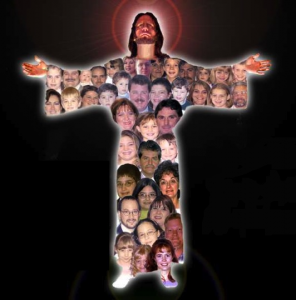A House of Prayer for All Nations
In Mark 11 we read that when Jesus entered Jerusalem — that final time — he “entered the temple and began to drive out those who were selling and those who were buying in the temple, and he overturned the tables of the money changers and the seats of those who sold doves; and he would not allow anyone to carry anything through the temple.” It was a provocative thing to do. Mark tells us that this incident is one of the primary reasons the religious leaders wanted to kill Jesus. It was a strong protest against the way religious service was being conducted.
And, then come these remarkable words:
He was teaching and saying, “Is it not written, ‘My house shall be called a house of prayer for all the nations’? But you have made it a den of robbers.”
And, as I read this passage I say to myself: if that was the case then, how much more now! Our various places of worship — wherever they may be — are intended to be places of prayer for all people. They are meant to point to God. They are meant to bring people into connection with God. They are meant for all people. Is that what they are?
The commentaries are quick to point out — and it’s an important point — that Jesus is alluding to the words of the prophets. It was not just his own judgement or opinion that he is giving here. He is proclaiming — through his actions and his words — how far they have fallen from the purpose God had for them. From Isaiah 56:7 comes the phrase “my house shall be called a house of prayer for all peoples.” From Jeremiah 7:11 comes the phrase “cave (or den) of robbers” (“Has this house, which is called by my name, become a den of robbers in your sight?“). As he does so often, Jesus is giving a faithful but radical re-application of the ideas found in the very Scriptures the religious authorities claim to uphold. It is Scripture come alive — in that moment.
 And, so, I believe God has said to all the generations of his followers ever since then: What have you made of my sanctuary? It is intended to be a house of prayer for all people. Everything that happens in the church — and all that is called “church” — is intended to establish and maintain people’s connection with the ultimate purpose and meaning of life. In this passage, the word “prayer” speaks of people’s connection to God. All the ecclesiastical and denominational structures, all the creeds, and the ritual, and the theological education, and the activities of the church serve a purpose — to be a place of prayer for all people.
And, so, I believe God has said to all the generations of his followers ever since then: What have you made of my sanctuary? It is intended to be a house of prayer for all people. Everything that happens in the church — and all that is called “church” — is intended to establish and maintain people’s connection with the ultimate purpose and meaning of life. In this passage, the word “prayer” speaks of people’s connection to God. All the ecclesiastical and denominational structures, all the creeds, and the ritual, and the theological education, and the activities of the church serve a purpose — to be a place of prayer for all people.
The human race is incurably religious in this sense: we are looking for a higher purpose and meaning for our lives. In fact, we need a sense of purpose for our lives in order to be genuinely happy. This is an essentially religious — or theological — quest.
I came across an article some time back that speaks to the need for human beings to find meaning for their lives. It appeared in The Atlantic online: Meaning Is Healthier Than Happiness. It appered in the Health section of the magazine. The summary statement is this: “People who are happy but have little-to-no sense of meaning in their lives have the same gene expression patterns as people who are enduring chronic adversity.” The author of the article, Emily Esfahani Smith, quotes researchers who say:
“Happiness without meaning characterizes a relatively shallow, self-absorbed or even selfish life, in which things go well, needs and desire are easily satisfied, and difficult or taxing entanglements are avoided,” the authors of the study wrote. “If anything, pure happiness is linked to not helping others in need.” While being happy is about feeling good, meaning is derived from contributing to others or to society in a bigger way. As Roy Baumeister, one of the researchers, told me, “Partly what we do as human beings is to take care of others and contribute to others. This makes life meaningful but it does not necessarily make us happy.”
Further on she writes:
Cole and Fredrickson found that people who are happy but have little to no sense of meaning in their lives — proverbially, simply here for the party — have the same gene expression patterns as people who are responding to and enduring chronic adversity. That is, the bodies of these happy people are preparing them for bacterial threats by activating the pro-inflammatory response. Chronic inflammation is, of course, associated with major illnesses like heart disease and various cancers.
More than any other institution in society, Churches are in the “meaning” and “purpose” business.
And, when we get out of that business we lose their reason to exist. We can keep the machinery of the church’s organizations going. We can raise money — some of it for worthy causes round the world, some of it to keep our own organizations functioning — and spend time meeting and organizing, but the questions must always be raised: for what purpose? For what end?
 People need to find a connection with their purpose in life — a connection with God. Everyone needs it — so you never know who might be looking for it at any given time. When the church becomes exclusive, it bars people from seeking. In that sense, every church needs to be “seeker sensitive.”
People need to find a connection with their purpose in life — a connection with God. Everyone needs it — so you never know who might be looking for it at any given time. When the church becomes exclusive, it bars people from seeking. In that sense, every church needs to be “seeker sensitive.”
Christians believe the Church is the Body of Christ — the continuing incarnation of Christ in the world. As such, the Church has a role and function in the world that is unlike and unequaled by any other institution or organization.
But, whether it can fulfill that function depends upon the vitality of its worship and prayer and service to others. When worship dies the church dies. When prayer dies out the life blood of the church is weak and anemic. When we no longer care about anyone but ourselves, we’ve lost our mission.
Out of worship, and prayer, and selfless service the streams of life emerge. We can’t afford boring, lifeless worship — it dams up the stream. We can’t afford prayer-less lives — there is a world in need. We can’t afford an excessive preoccupation with ourselves — the God we serve loves all people. The stream of life needs to flow.
I can understand why people get lost spiritually. I can understand why people think they can find fulfillment in a superficial happiness — and they things that seem guaranteed to produce that.
The Church needs to teach and live a deeper life than that.

















